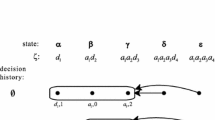Abstract
The paper provides a framework for representing belief-contravening hypotheses in games of perfect information. The resulting t-extended information structures are used to encode the notion that a player has the disposition to behave rationally at a node. We show that there are models where the condition of all players possessing this disposition at all nodes (under their control) is both a necessary and a sufficient for them to play the backward induction solution in centipede games. To obtain this result, we do not need to assume that rationality is commonly known (as is done in [Aumann (1995)]) or commonly hypothesized by the players (as done in [Samet (1996)]). The proposed model is compared with the account of hypothetical knowledge presented by Samet in [Samet (1996)] and with other possible strategies for extending information structures with conditional propositions.
Similar content being viewed by others
References
Adams E. (1975) The logic of conditionals. Reidel, Dordrecht
Arló-Costa H. (1999) ‘Belief revision conditionals: basic iterated systems’. Annals of Pure and Applied Logic 96:3–28
Arló-Costa, H., and C. Bicchieri, ‘Games and Conditionals’. TARK VII, Theoretical Aspects of Rationality and Knowledge, July 22-24, 1998, Evanston, Illinois, USA, 1998.
Arló-Costa H., Thomason R. (2001) ‘Iterative probability kinematics’. Journal of Philosophical Logic 30:479–524
Arló-Costa H. (2001) ‘Bayesian Epistemology and Epistemic Conditionals: On the Status of the Export-Import Laws’. Journal of Philosophy Vol. XCVIII 11:555–598
Aumann R. (1995) ‘Backward induction and common knowledge of rationality’. Games and Economic Behavior 8:6–10
Battigalli P., Bonanno G. (1997) ‘The logic of belief persistence’. Economics and Philosophy 13:39–59
Bicchieri, C., and O. Schulte, ‘Common Reasoning about Admissibility,’ Erkenntnis 45 (1997).
Bicchieri, C., and A. Antonelli, ‘Game-theoretic Axioms for Local Rationality and Bounded Knowledge,’ Journal of Logic, Language and Information 4 (1997).
Bicchieri, C., ‘Counterfactuals, Belief Changes, and Equilibrium Refinements’, Philosophical Topics 21 (1994).
Bicchieri C. (1989) ‘Self-Refuting Theories of Strategic Interaction: A Paradox of Common Knowledge’. Erkenntnis 30:69–85
Bicchieri C. (1988) ‘Strategic Behavior and Counterfactuals’. Synthese 76:135–169
Bicchieri C. (1988). ‘Common Knowledge and Backward Induction: A Solution to the Paradox’. In: Vardi M. (ed). Theoretical Aspects of Reasoning about Knowledge. Morgan Kaufmann Publishers, Los Altos, pp 1–5
Bicchieri C. (1993) Rationality and Coordination. Cambridge University Press, New York
Collins, J., ‘Newcomb’s Problem,’ 1999. http://www.columbia.edu/jdc9/download.html
Cross, C., and D. Nute, ‘Conditional Logic,’ in D. Gabbay and F. Guenthner (eds.), Handbook of Philosophical Logic, second edition, Vol III Extensions of Classical Logic, Reidel, Dordrecht, 1998.
Binmore K. (1996) ‘A note on Backward Induction’. Games and Economic Behavior 17: 135–37
Gärdenfors, P., ‘Conditionals and changes of belief,’ in I. Niiniluoto and R. Tuomela (eds.), The Logic and Epistemology of Scientific Change, Acta Philosophica Fennica 30 (1978), 381–404.
Gärdenfors P. (1986) ‘Belief revisions and the Ramsey test for conditionals’. Philosphical Review 95: 81–93
Gärdenfors P. (1988) Knowledge in Flux, Bradford Book. MIT Press, Cambridge, Mass
Halpern, J., ‘Hypothetical knowledge and counterfactual reasoning,’ TARK VII, Theoretical Aspects of Rationality and Knowledge, July 83–97, 1998, Evanston, Illinois, USA, 1998.
Hansson S.O.(1992) ‘In Defense of the Ramsey Test’. Journal of Philosophy 89: 522–540
Joyce J. (1999) The Foundations of Causal Decision Theory. Cambridge University Press, Cambridge
Levi I. (1988) ‘Iteration of conditionals and the Ramsey test’. Synthese 76: 49–81
Lewis D. (1973) Counterfactuals. Basil Blackwell, Oxford
Lewis D. (1976) ‘Probabilities of conditionals and conditional probabilities’. Philosophical Review 85: 297–315
Ramsey, F. P., Philosophical Papers, H. A. Mellor (ed.), Cambridge University Press, Cambridge, 1990.
Samet D. (1996) ‘Hypothetical knowledge and games with perfect information’. Games and economic behavior 17 :230–251
Stalnaker R.C. (1968) ‘A theory of conditionals’, Studies in Logical Theory. American Philosophical Quarterly Monograph 2: 98–112
Stalnaker R.C., Thomason R. (1970) ‘A semantical analysis of conditional logic’. Theoria 36: 246–281
Rubinstein, A., Modeling Bounded Rationality, MIT Press, 1997.
Author information
Authors and Affiliations
Corresponding author
Additional information
This research was funded by the National Science Foundation: “Game-Theoretic Foundation for Multi-Agent Systems”, IIS 9734923.
Special Issue Formal Epistemology II. Edited by Branden Fitelson
Rights and permissions
About this article
Cite this article
Arló-Costa, H., Bicchieri, C. Knowing and Supposing in Games of Perfect Information. Stud Logica 86, 353–373 (2007). https://doi.org/10.1007/s11225-007-9065-6
Received:
Published:
Issue Date:
DOI: https://doi.org/10.1007/s11225-007-9065-6




